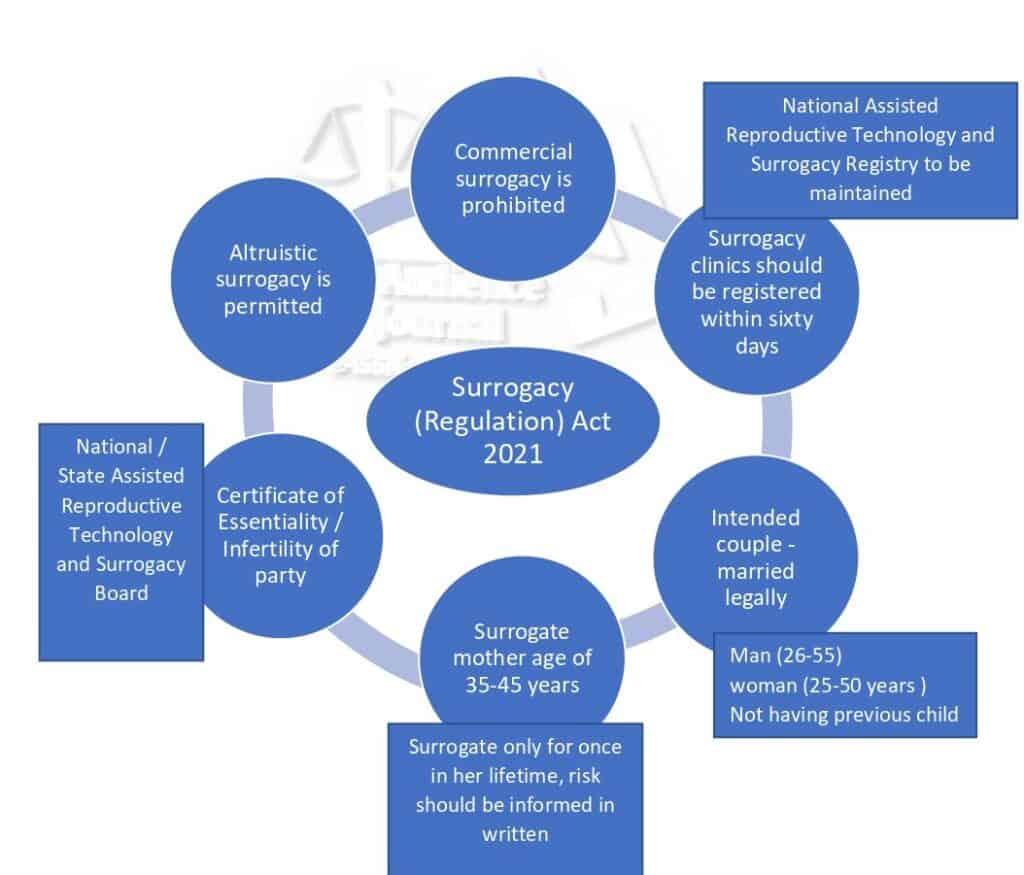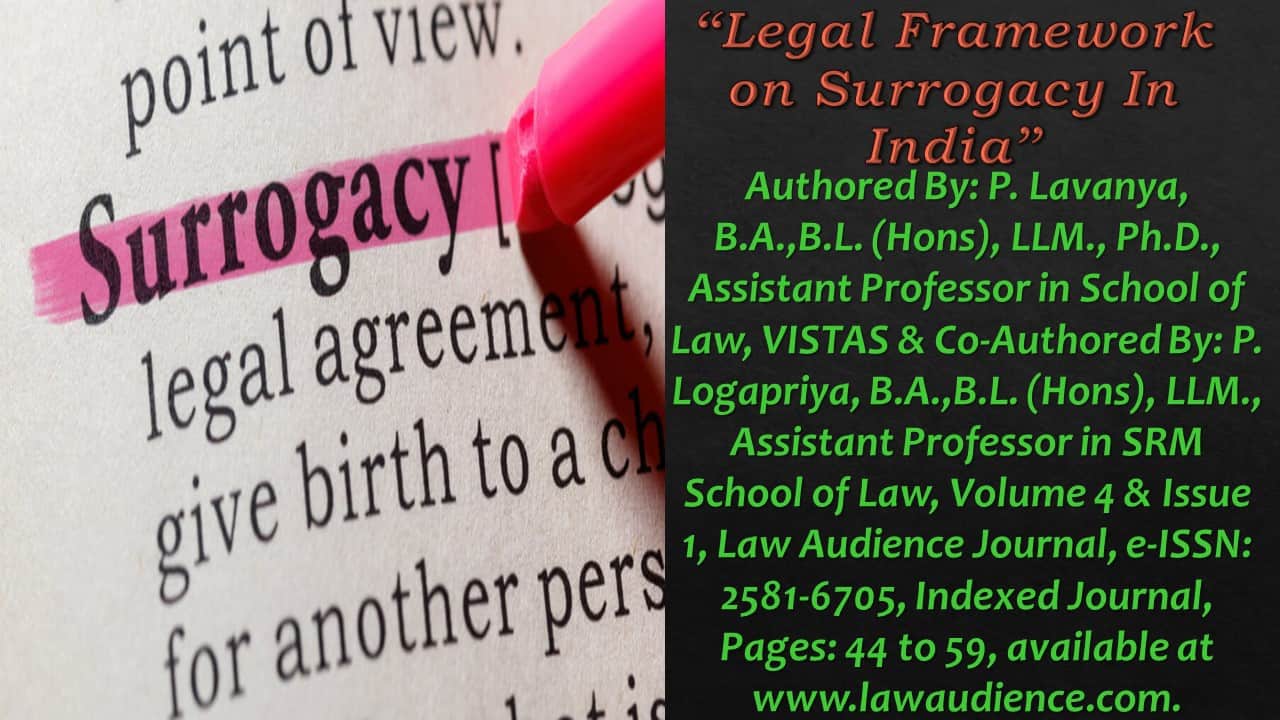Click here to download the full paper (PDF)
Authored By: P. Lavanya, B.A.,B.L. (Hons), LLM., Ph.D., Assistant Professor in School of Law, VISTAS,
Co-Authored By: P. Logapriya, B.A.,B.L. (Hons), LLM., Assistant Professor in SRM School of Law,
Click here for Copyright Policy.
ABSTRACT:
Surrogacy is not a new concept it could be traced from mythological surrogate mothers such as Yashoda and Gandhari. India is being capital of surrogacy as our country provides positive impact for infertile couples with low cost, least restrictions, a greater number of surrogated mother and lack of stringent regulation of surrogacy clinics and most importantly the advancements in IVF technology make our country to move step forward across the world. At the same time there are a greater number of chances for exploitation of surrogate mother as they are coming from socially and economically weaker section. And this act allows a woman, only those who are willing to be a surrogate mother and not by compulsion.
Now a days the couples who are unable to bear child having various options to beget a genetically related child. It is possible through advancement in medical science particularly in the field of Artificial Human Reproductive Technologies. In this ART, surrogacy is being prime option for many childless couples in protecting their bonafide interest of want of child. As a result of it, commercial surrogacy was increased and misused. Observing this, several regulations, bills and amendments were introduced to curb the malpractice and misuse of surrogacy in India. The Surrogacy (Regulation) Act 2021which protects the rights of the child and surrogated mother under surrogacy contract in ethical, social and moral legislation and protection against exploitation. Hence this act has positive impact of fair play by safeguarding on “mother workers”.
This act mainly deals with allowance of altruistic surrogacy, prohibition on commercial surrogacy, abandoning child and regulation of surrogacy clinics, written consent of surrogated mother and her rights, regulatory procedures, prescribed implantation, prohibition of abortion, Surrogacy clinics, registration of surrogacy under National Assisted Reproductive Technology and Surrogacy Registry and board, Authorities, offences and penalties. Fertility industries increase its velocity in birth technologies has given a new dimension of hope to eradicate social stigma associated with infertility. This immense surrogacy progress has made India as a “Reproductive Tourism Industry”.
Keywords: Artificial Reproductive Technology, Surrogacy, Regulation, Surrogated Mother, Child, Rent of Womb, Commercial Surrogacy, Right to Life and Privacy.
I. INTRODUCTION:
Now a days the couples who are unable to bear child having various options to beget a genetically related child. It is possible through advancement in medical science particularly in the field of Artificial Human Reproductive Technologies. In this ART, surrogacy is opted by many childless couples. Surrogacy was legalized in India in the year 2002. Due to low-cost medical efficiency, India currently becomes top destination for surrogacy. In 2012, as per the survey from the UN, India was declared as the “world capital of surrogacy” and was known as the “cradle of the world”. The practice of surrogacy was misused by several ways and also issues were arising in renting of womb, selection of surrogate, custody of child. So, several guidelines were drafted by Indian Council for Medical Research to regulate the fertility related services. But these guidelines were not legally binding. In recent years also several bills like surrogacy (regulation) bill were introduced aiming to ban commercial surrogacy, to avoid unethical practices of surrogacy and to curb the malpractice and misuse of surrogacy.
I.I OBJECTIVES:
- To analyse the surrogacy in India
- To examine the various legislation relating to Surrogacy in India
- To analyse the judicial response relating to surrogacy.
I.II SURROGACY – MEANING:
The term surrogacy originates from the Latin word “Surrogatus”, which roughly defines a substitute, i.e., a person appointed to act in the place of another. Here a woman acts as a substitute for another woman. Black’s Law Dictionary defines surrogacy to mean the “process of carrying and delivering a child for another person”.[1] The ART bill defined surrogacy as ‘an arrangement in which a woman agrees to a pregnancy, achieved through assisted reproductive technology, in which neither of the gametes belong to her or her husband, with the intention to carry it to the term, and hand over the child to the person or persons for whom she is acting as surrogate.’ The Surrogacy (Regulation) Bill, 2019, defines ‘surrogacy as a practice whereby one woman bears and gives birth to a child for an intending couple with the intention of handing over such child to the intending couple after birth.’
Surrogacy is a method or agreement whereby the surrogate mother agrees to carry a pregnancy for another person who will become the newborn child’s parents after birth. Same sex couples, whose pregnancy is medically impossible, or pregnancy risk present an unacceptable danger to the mother’s health preferred surrogacy. Through surrogacy the surrogate mother become pregnant, gestate and give birth to child, then physically and legally transfer the child to the intending parents without retaining any parentage or parental obligation. There are several types of surrogacies are there: General surrogacy, altruistic surrogacy, commercial surrogacy.
II. SURROGACY IN INDIA:
In 2002, the commercial surrogacy or “Rent a Womb” practice was legalized in India. Later India became “the hub of surrogacy” for international parents. The main reason is excellent medical facilities with relatively low cost in India as well as proper framework and legislation.
The 228th report of Law Commission of India found that one of the prime reasons for surrogacy services in India recommended for allowing altruistic surrogacy by enacting suitable legislation and for prohibiting commercial surrogacy. Based on this report the Indian Council for Medical Research framed its guidelines. In 2005, the ICMR (Indian Council for Medical Research) drafted a set of guidelines regarding surrogacy in India. The guidelines were mainly for ART (Assisted Reproductive Technology) clinic relating to surrogacy procedure and codified the rights and obligations of the surrogate mothers without mentioning the penalties. In 2008, the Assisted Reproductive Technology (Regulation) Bill was drafted. It mainly explained about the infrastructure, procedure followed for selecting surrogate mother, donor and patient and also their rights. In 2014, draft Assisted Reproductive Technology (Regulation) Bill was drafted. It mainly elaborates about the issues and it allows the exchange of money only for medical expenses. So, it indirectly banned the commercial surrogacy. For regulating surrogacy, it provides to establish National Surrogacy board at Central level and State Surrogacy board at state level.
In 2016, The Surrogacy Regulation Bill was drafted. This bill allows ethical altruistic surrogacy. It imposes certain conditions regarding surrogacy like the intending couples should be legally married, they should not abandon the surrogate’s child and that child having all the rights and privileges of biological child. The surrogate mother shall be act as a surrogate mother only once. This bill also provides to establish National Surrogacy board at Central level and State Surrogacy board at state level. But this bill is lapsed. Although this bill is pending, in 2019 The Surrogacy (Regulation) Bill is passed by parliament. This bill banned commercial surrogacy and allows ethical altruistic surrogacy. According to the section 4(ii) of the Surrogacy (Regulation) Bill, 2019, for the following purposes for which surrogacy can be permitted.[2]
- Only for altruistic purposes
- Not for producing children for sale, prostitution or other form of exploitation
- For couples who suffer from proven infertility
- Any other conditions as specified through regulations.
This Surrogacy (Regulation) Bill, 2019 was reviewed by Shri Bhupendra Yadav committee and few recommendations were given therefore resulting in the Surrogacy (Regulation) bill, 2020. It also brought several changes like even widow or divorcee also having right to surrogate whose age is between 35 to 45 years. Insurance coverage also increased.
III. THE SURROGACY (REGULATION) ACT 2021:
In order to help the childless couples to get child through the regulated legal process of surrogacy and practice, on 25th December 2021 the Surrogacy (Regulation) Act was enacted only after the president’s Shri Ramnath Kovind assent.

This act introduces some new regulations in the surrogacy era. They are:
- A single man or woman is not eligible for surrogacy
- This act banned the commercial surrogacy, the buying and selling of human embryos as this type of surrogacy provides medical expenses and compensation for surrogated mother but there is no equal power balance between the contracting parties. This is more prevalence in cases where surrogates are pressurized by their own husband for the financial support of the family and the commercial surrogacy contract mostly held up between Indian surrogate mother and foreign intending couples. Fee for this surrogacy is so minimal when compared to other countries.
- This act legalizes Altruistic surrogacy. Under this surrogacy the intending couple must get prior parentage order from the 1st class Magistrate or above along with the proof of infertility of either of the couple and eligibility certificate. The age criteria are a fixed one, the couple must attain the minimum age of 25 years and should not beyond 35 years. And most importantly this act of generosity must be held only between the close relatives and not with others.
- Only after the surrogated mother informed about the risks and consequences the contract should be made. Anytime she reserved right to withdraw her consent before the embryo is implanted. The intending couple must provide insurance for both the surrogated mother and the child in womb. In any situation the child born out of surrogacy contract should be left abandon if so, intending couples will be severely punished and at the same time none of the person could forces the woman to terminate child or contract. Presumption of a child born out of a surrogacy procedure will be deemed to be the biological child of the intending couple. An abortion of the surrogate child requires the written consent of the surrogate mother and the authorization of the appropriate authority with compliance to the Medical Termination of Pregnancy Act, 1971.
- Inorder to function the surrogacy clinic it must have get certificate of registration which were dealt under chapter 4 of this act and for this purpose a registry was maintained which was established by National Assisted Reproductive Technology and Surrogacy Board. For a period of twenty-five years the clinic should maintain all the related documents, reports, records, forms, letters and such other things under section 46 of the act. But at the same the clinic has to maintain the same until the criminal proceedings come to an end.
- National and state surrogacy boards:
- The National Surrogacy Board (NSB) and the State Surrogacy Boards (SSB), respectively constitute under the central and the state governments.
- Important functions of the National Surrogacy Board to advice the central government on policy matters relating to surrogacy; Laying down the code of conduct for surrogacy clinics; Supervising the functioning of State Surrogacy Boards.
III.I OFFENCES AND PUNISHMENTS (SEC 38- 45):
Offences with related to surrogacy shall be a cognizable offence which are not a bailable offence and non-compoundable one, decision and order shall be taken by the National Assisted Reproductive Technology and Surrogacy Board in which totally 23 members are there.
| Section | Offences | Maximum Punishments |
| Contravention with this Act, rules and regulation | Imprisonment – 3 years
Fine – 5 Lakh Rupees |
|
| Continuing contravention | additional fine which may extend to Rs.10,000/- for every day | |
| Sec 38
Prohibition of commercial surrogacy, exploitation of surrogate mothers and children born through surrogacy |
|
Imprisonment of a term which may extend to 10 years and A fine which may extend to ten lakh rupees.
|
| Section 39
Registered medical practitioner |
Other than the provisions referred to in section 38
|
Imprisonment – 5 years and
Fine – 10 lakh rupees.
|
| Subsequent or continuation of the offence | suspension of registration for a period of five years | |
| Section 40 | Not follow altruistic surrogacy and conducting commercial surrogacy in an unethical way which includes reaching out to any surrogacy clinic, medical practitioner, gynecologist, pediatrician, embryologist or any other person | imprisonment – 5 years
fine – 5 lakh rupees |
| Subsequent offense | imprisonment – 10 years fine – 10 lakh rupees
|
|
| Section 41
|
Penalty for contravention of provisions of Act or rules for which no specific punishment is provided. | Imprisonment – 3 years and
Fine – 5 lakh rupees.
|
| Continuing contravention | additional fine which may extend to ten thousand rupees for every day | |
| Section 42 | Notwithstanding anything contained in Indian Evidence Act, 1872 – It is Presumed that Unless the contrary is proved the court shall presume, that the women or surrogate mother was compelled by her husband, the intending couple or any other relative, as the case may be, to render surrogacy services, procedures or to donate gametes for the purpose other than those specified in clause (ii) of section 4.
|
liable for abetment of such offense under section 40 and shall be punishable for the offence specified under that section |
| Section 43 | Notwithstanding anything contained Cr.P.C 1973, Every offence to be cognizable, non-bailable and non-compoundable. | |
| Section 44 | Complaint in writing must be there. Should not inferior to Metropolitan Magistrate or a Judicial Magistrate of the first class shall try any offence |
|
| Section 45 | (Plea bargaining) Certain provisions of Code of Criminal Procedure, 1973 not to apply. |
IV. CONSTITUTIONAL SCRUTINY OF THE SURROGACY (REGULATION) ACT, 2021:
The major obstacle comes in surrogacy is interests of both parties can be change their mind at any time and most of the time the surrogated mother will be victimized. There are two rights imbedded under our constitution
- To prevent exploitation of surrogate mothers and protect the rights of the unborn child is the first duty of the State.
- Second important thing is the right of the women to make their own reproductive choices and rights of the intended parents.
Still, it is hard to find a right balance between these conflicting interests in regulation of surrogacy. Some community people Right to Reproduction and choices was completely denied i.e., single people, older couples, LGBTQ couples, and it is a clear violation of Article 21 as well as Article 14 of the Indian Constitution in Devika Biswas v. Union of India, Article 21 of the Indian Constitution has been invoked in this case. The Apex Court held that Right to Reproduction is not just deliver a baby to the earth, it includes the right to carry a baby, giving birth, raising them and also an essential facet of the ‘Right to Life’ under our constitution. Thus, it creates a partial imbalance while restricting surrogacy to a particular group of age among heterosexual couples.
Art. 19(1)(g) provides ‘freedom of trade and profession’ under Indian Constitution. At the same time Article 19(6) provides reasonable restrictions for the protection of public interest. In the case of Chintaman Rao vs. State of Madhya Pradesh, the Apex Court has held that ‘restriction’ must be reasonable and not be an arbitrary and excessive. This would be right to say that there must be reasonable balance between the freedom granted and the restriction imposed. The Supreme Court held that a total ban on bar dancing is unconstitutional as many women moving their life into balanced one through the dance payment and there is a chance that total ban would then be forced to take up odd jobs to survive. Likewise, it would be a violation on Article 19(1)(g) when the bill levy total ban on commercial surrogacy.
In E. P. Royappa vs. State of Tamil Nadu, the concept of equality was broadened, wherein it was held that equality is a dynamic concept, and its dimensions cannot be cribbed and confined in anyway with traditional doctrinaire limits. Reasonable classification is must be based of intelligible differentia and has no nexus with the object sought to be achieved, then only the differentiation is treated as a valid. Furthermore, transgenders had recognized as third genders, in the leading case of National Legal Services Authority vs. Union of India, by the Supreme Court. But it is a big question whether the Bill is providing equal rights to the third genders. The Bill disentitles same-sex couples and transgenders from commissioning surrogacy and the grounds are very narrow. The Apex Court held that Article 21 of the constitution provides right to life which also includes the ‘right to livelihood’ in the leading case of Consumer Education and Research Centre and Ors. vs. Union of India.
In the case of Olga Tellis vs. Bombay Municipal Corporation. However, by execution of a blanket ban on commercial surrogacy, the bill turns out to provides negative impact on women and tends to violate the right to livelihood since poor women lose her daily wages along with her some kind of financial independence or stability. Further, in the case of Devika Biswas vs. Union of India, the Hon’ble Supreme Court held that right to reproduction in an important component of ‘right to life’ under Article 21 and thus reproductive rights of a woman includes rights to privacy, dignity and integrity and right to choose an option of surrogate mother are also included.
In the matter of R. Rajagopal vs. State of Tamil Nadu, after referring to Kharak Singh and American decisions, the learned Judge stated that right to privacy must encompass and protect the personal intimacies of the home, the family life, marriage life, her motherhood, procreation and child rearing”. The Supreme Court in its landmark judgement K.S. Puttaswamy vs. Union of India, held that privacy of a person also includes mind, body and other choices and extends to his/her personal autonomy.
The Supreme Court also looked into the case of B. K. Parthasarthi vs. Government of Andhra Pradesh, one’s “right to privacy” is amount to a direct encroachment whenever state interfered with one’s procreation held by the Andhra Pradesh High Court. Hence, considering the above facts and circumstances it seems to be clear that the reproduction or procreation is a very personal and private decision and must be respected, the Bill must be firm hand that the state can interfere only to the minimum extent in such a decision-making process. There has been great failure on the part of government in the justification of why unmarried and childless women could not become surrogates. The right to control her body, fertility and motherhood choices are purely depend upon none other than that particular woman. Hence, under Article 21 the Bill has partially aligned with the right to livelihood, right to privacy, and right to reproductive autonomy.
V. SURROGACY IN OTHER COUNTRIES:
Different countries have different perspective on surrogacy laws and its legality. Most of the countries though dealt with surrogacy they do not have any sort of regulations. Some countries are totally prohibiting surrogacy, while others restrict commercial surrogacy into some limit and permit altruistic surrogacy. In certain jurisdictions international surrogacy is prohibited.
V.I UNITED KINGDOM:
Surrogacy is legalized in the United Kingdom. The surrogate mother will be the child who born out of surrogacy contract is legitimate parent at birth and in case of a married surrogate or if she is in a relationship, their spouse or partner will be the child’s second parent at birth. The legal parenthood can be transferred by parental order or adoption only after the birth of the child. Keeping the paramount interests of the child the court will decide the issue in case of a dispute regarding who will be the child’s legal parents. It is pertinent to note that surrogacy agreements are not reinforced by UK law though intended parents and surrogate have signed a document and all the expenses are paid to the surrogate. Only reasonable costs can be paid to the surrogate[3] and not beyond it.
V.II SOUTH AFRICA:
In South Africa the surrogacy law is governed by the Children’s Act of 2005 governs. This country strictly prohibited the commercial surrogacy. The intending couple will pay the surrogated mother only for expenses which are directly related to the surrogacy, i.e., medical costs and loss of income during the pregnancy during pregnancy to delivery period. Upon the birth of the child the commissioning parents are the lawful parents, and the surrogate mother cannot legally terminate the pregnancy for whatsoever reasons except for medical purpose. Only after the court’s decision in some critical cases apart from the medical reasons, the surrogate may allow to abort that too after hearing the intended parents. At the time of signing the agreement either or both commissioning parents and the surrogate should be the resident of this country. In order to get the biological link, and claim of natural relation to the child at least one of the commissioning parent’s gametes have to be used[4].
V.III FRANCE:
If any of the French people who opt for surrogacy outside of France country then the presumption is they are acting deliberately against French law. Likewise, the birth of the child will not be included in the French birth register instead the child will have a foreign birth certificate and the nationality of their country of delivery[5].
V.IV GERMANY:
Surrogacy is prohibited by the law of Germany. With intent to make any woman to give birth to a child if anyone performs artificial insemination or transfers a human embryo to a woman, can be sentenced with up to three years imprisonment, or a fine is imposed. In such cases, it is the physician who is punished and not the intended parents or the surrogate[6].
V.V RUSSIA:
Surrogacy is legalized in Russia and only gestational surrogacy arrangements are permissible. Though the surrogacy is permitted for foreign nationals and unmarried couples, the surrogacy is only allowed to heterosexual couples and single females. Single women must use their egg cells for the creation of the embryo that will be placed into the gestational surrogate’s womb. The names of intended parents are entered on the birth certificate, and they are the child’s legal parents[7].
V.VI BELGIUM:
Altruistic surrogacy is permitted in Belgium, but the commercial surrogacy is prohibited by law[8].
V.VII AUSTRALIA:
Presently under Australian law, altruistic surrogacy is allowed, but commercial surrogacy is banned in many places like New South Wales, Queensland, Tasmania and the Australian Capital Territory[9].
VI. LEGAL AND ETHICAL ISSUES RELATED TO SURROGACY IN INDIA:
- Out of good intention to help the childless parents (free of cost) or by financial force of the family the surrogated mother is constrained to go through the physical and emotional tolls under the surrogacy contract. Here her health is severely weakening.
- In some cases, the jobless husband induces his wife to do surrogacy which clearly shows that such an expectation is patriarchal dominance over her.
- The LGBTQ persons, living in relationship couples, divorced person and single parents are totally denied this type of opportunity, it is purely violative of Article 14 and Article 21 of the Indian Constitution.
- Meanwhile the intending parties must provide a “certificate of essentiality” which clearly denotes either or both parties’ infertility that it is impossible to have child in biological way.
- From the perspective of surrogated mother this act does not consider other mental and physical conditions which make the pregnancy riskier and more difficult.
- It also does not consider cases where women might not want to go through pregnancy due to career-related commitments.
- The legal and ethical issues, allied to surrogacy, are very multifaceted and mostly disconcerted. It is going to be a never-ending discussion. There is a default legal assumption in most of the countries that the women, giving birth to a child, are the child’s legal mother. Is it iniquitous if the surrogate decides to maintain her privacy? The surrogate has to sustain the abstinence with her partner, and it should not be infringed.
- In future when the child, born out of surrogacy, comes to know about the reality, he or she may wish to meet the birth mother. In case, during the period when the agreement between a surrogate and intending parents is in force, if any mishap occurs with intending parents, who will take the custody of the child? The custodial issue of the child may also surface if intending parents undergo matrimonial discord during the surrogacy contract.
- This act provides that the surrogate can abort the child in compliance with Medical Termination of Pregnancy Act 1971. If at any stage she is not willing to continue the pregnancy to full term and she wishes to revoke the surrogacy contract, then will she be allowed for the same or not? In the Baby M case[10], the court observed that it is very difficult to understand consent in cases of surrogacy. The surrogate mother may develop deep attachment with a child which leads to changes in the will to part with the child.
VII. CONCLUSION:
Surrogacy is legal in India. But, making it commercial is illegal. Surrogacy is a humanitarian act and is recognized by law. It is not permitted by Indian law. No couple should choose commercial surrogacy. Surrogacy comes under the reproductive choices of women, and it is included as a fundamental right under the purview of Article 21 of the Indian Constitution. Surrogacy has adjourned the practice of adoption by childless couples who can bear the cost of surrogacy.
It can also be a blessing in some situations, e.g., same-sex marriages, single women, single men, although it is not legalized in India. Surrogacy arrangement will continue to be regulated by an agreement amongst parties, involving the consent of the surrogate mother, the treaty of her husband and other family members for the same, compensation of all generous expenses for carrying a child to full term along with the willingness to hand over the child born to the intending parents. The need of the hour is to legalize altruistic surrogacy and prohibiting commercial one. Till laws being enacted and appropriate monitoring authorities are instituted, one has to assess with his/her conscience what is right and where wrong begins.
Due to some conflicting provisions and shortcomings in the Surrogacy (Regulation) Act, 2021 there is chance of development of an illegal market in surrogacy services. Which would tend to non-protection of the rights and interests of surrogate mothers and intended parents that have been raised regarding barriers such as age limitations and excluding queer couples, not aiding in the progression of society, as surrogacy should be recognized as a reproductive right available to all individuals irrespective of their place in the community.
Cite this article as:
P. Lavanya & P. Logapriya, “Legal Framework on Surrogacy in India”, Vol.4 & Issue 1, Law Audience Journal (e-ISSN: 2581-6705), Pages 44 to 59 (9th May 2022), available at https://www.lawaudience.com/legal-framework-on-surrogacy-in-india/.
Footnotes & References:
[1] R. S. Sharma, Social, ethical, medical & legal aspects of surrogacy: an Indian scenario, Indian Journal of Medical Research, (https://www.ncbi.nlm.nih.gov/pmc/articles/PMC4345743/).
[2] RSTV: IN DEPTH- NEW SURROGACY BILL, INSIGHTS ON INDIA (AUGUST 5, 2019), https://www.insightsonindia.com/2019/08/05/rstv-in-depth-new-surrogacy-bill/Not for commercialization.
[3] Surrogacy: legal rights of parents and surrogate. Available at: https://www.gov.uk/legal-rights-when-using-surrogates-and-donors.
[4] No. 38 of 2005: Children’s Act, 2005 (2006). Government Gazette. Republic of South Africa. Available at: https://www.gov.za/sites/default/files/gcis_document/201409/a38-053.pdf.
[5] Courduries, J. (2018). At the nation’s doorstep: the fate of children in France born via surrogacy. Reproductive Biomedicine & Society Online, 7, 47–54. Doi: http://doi.org/10.1016/j.rbms.2018.11.003.
[6] Germany debates legalizing egg donations and surrogacy (2019). Available at: https://www.thelocal.de/20190813/germany-debates-legalizing-egg-donations-and-surrogacy.
[7] Salvador, Z., Packan, R. (2019). Is Surrogacy Legal in Russia? – Law, Cost & Requirements. Babygest EN. Available at: https://babygest.com/en/russia/.
[8] International Surrogacy Laws. Ukranian Family Law. Available at: http://www.familylaw.com.ua/index.php?option=com.
[9] Australian Surrogacy Laws. Available at: https://www.iflg.net/australian-surrogacy-laws/.
[10] 537 A.2d 1227, 109 N.J 396.




